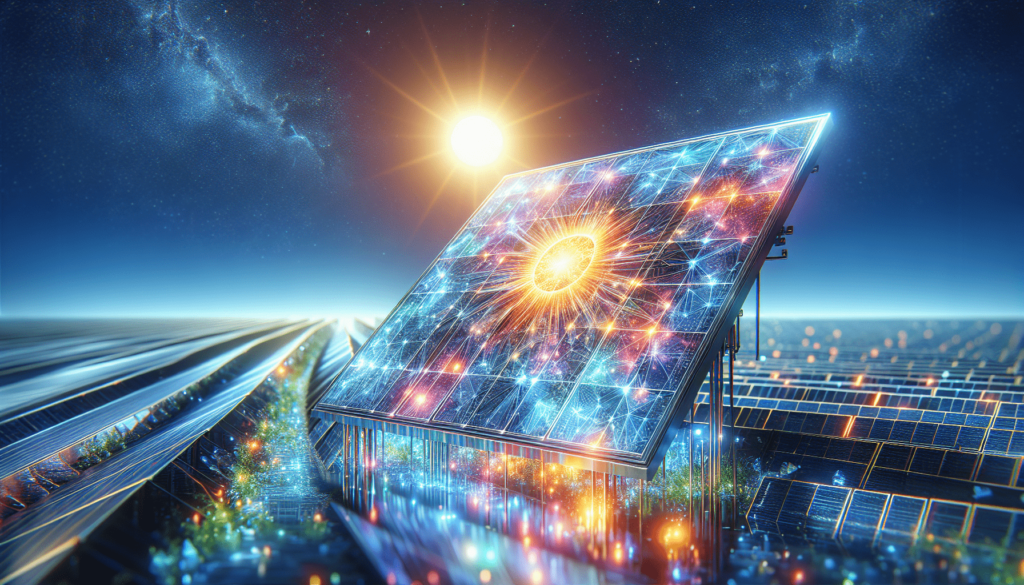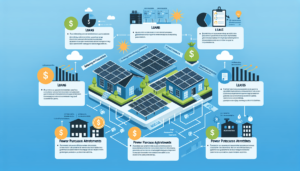Imagine a world where renewable energy is abundant and accessible to all. A world where solar panels glisten on rooftops, harnessing the power of the sun to provide clean and sustainable electricity. This captivating introduction encapsulates the essence of this article, as we delve into the future of solar energy. We will explore the advancements and potential breakthroughs that lie ahead, paving the way towards a brighter and greener future for our planet. Join us on this enlightening journey as we unlock the secrets of the sun and envision a world powered by the limitless potential of solar energy.

Increasing Adoption of Solar Energy
The future of solar energy looks promising, with a growing global demand for clean energy. As concerns about climate change and environmental sustainability increase, there is a significant shift towards renewable energy sources. Solar energy is at the forefront of this transition, with major investments being made in solar energy projects worldwide. Governments around the world are also providing incentives and implementing policies to support the adoption of solar energy.
Technological Advancements
One of the key factors contributing to the future of solar energy is the continuous improvement in solar panel efficiency. The advancements in solar panel technology have significantly increased their conversion efficiency, allowing them to generate more electricity from the same amount of sunlight. These improvements have made solar energy more affordable and accessible to a wider audience.
In addition, innovative solar cell technologies are being developed to make solar energy even more efficient. These technologies include perovskite and multi-junction solar cells, which can potentially achieve higher efficiency levels than traditional silicon-based cells. With ongoing research and development in this area, the future of solar energy holds the promise of even greater efficiency and performance.
Furthermore, the integration of solar energy with storage solutions is another technological advancement shaping the future of solar energy. Energy storage systems, such as batteries, allow excess solar energy to be stored for use during periods of low sunlight. This enables a more consistent supply of electricity from solar energy, overcoming the intermittent nature of sunlight. As energy storage technology continues to evolve and improve, solar energy will become an even more reliable source of renewable power.

Reduction in Solar Energy Costs
The future of solar energy is also characterized by a significant reduction in costs. Over the years, the price of solar panels has been steadily declining due to advancements in manufacturing processes. The economies of scale resulting from increased production and competition in the solar industry have also contributed to cost reductions. As solar panel prices become more affordable, the barrier to entry for adopting solar energy decreases, making it a viable option for both residential and commercial use.
Moreover, the enhanced manufacturing processes have not only reduced the cost of solar panels but also improved their quality and durability. This ensures that solar installations have a longer lifespan, providing a good return on investment for individuals and businesses embracing solar energy.
Grid Integration Challenges
While the future of solar energy is promising, there are challenges to be addressed, particularly regarding the integration of solar energy into the power grid. One of the key challenges is managing the intermittent electricity generation associated with solar power. As solar energy is reliant on sunlight, there are periods of low or no generation, such as during the night or on cloudy days. Effectively balancing the intermittency of solar energy with other renewable energy sources, such as wind power or hydroelectricity, is crucial for maintaining a stable and reliable power grid.
Furthermore, upgrading and expanding power grid infrastructure is essential to accommodate the increasing adoption of solar energy. This requires investments in smart grid technologies that can efficiently manage and distribute electricity generated from solar installations. By integrating smart grid solutions, the power grid can adapt to the changing energy landscape and efficiently incorporate solar energy into the existing infrastructure.

Solar Energy in Urban Areas
The future of solar energy extends to urban areas where innovative solutions are being explored. Rooftop solar installations have become increasingly popular, especially in residential buildings and commercial spaces. This allows urban dwellers to generate their own clean energy and reduce their reliance on traditional power sources. Additionally, the integration of solar energy in smart cities is gaining traction, with solar panels being seamlessly incorporated into urban infrastructure, such as streetlights or bus shelters. This not only utilizes the available space effectively but also enhances the overall energy efficiency of urban areas.
Efficiency improvements in urban solar systems are also being pursued to maximize the potential of solar energy. This includes implementing advanced tracking systems that adjust the position of solar panels throughout the day to optimize sunlight absorption. By utilizing urban rooftops, advanced tracking systems, and integrating solar energy in smart cities, urban areas can play a significant role in the future of solar energy.
Emerging Solar Technologies
Looking ahead, emerging solar technologies have the potential to revolutionize the way we harness solar energy. One such technology is floating solar farms, where solar panels are installed on floating platforms in bodies of water such as lakes or reservoirs. This approach not only solves the issue of land requirements for large-scale solar installations but also offers additional benefits. Floating solar farms can help reduce water evaporation from reservoirs while generating electricity, making them a sustainable option for water management.
Solar-powered desalination plants are another innovative application of solar energy. These plants use solar energy to power the desalination process, converting saltwater into fresh water. By combining solar energy and desalination technologies, these plants can provide clean drinking water to areas facing water scarcity, thereby addressing two critical challenges simultaneously—clean energy production and water sustainability.
Furthermore, solar energy is being integrated into electric vehicles, creating a symbiotic relationship between renewable energy and transportation. Solar integrated electric vehicles use solar panels mounted on the vehicle’s surface to generate electricity, which can then be used to power the vehicle’s operations. This reduces the reliance on traditional fuel sources and promotes sustainable transportation practices.

Job Creation and Economic Growth
The future of solar energy not only brings environmental benefits but also contributes to job creation and economic growth. The expanding solar industry has led to a surge in job opportunities, particularly in the manufacturing, installation, and maintenance sectors. As the demand for solar installations continues to rise, so does the need for skilled professionals in the solar industry. This presents an opportunity for individuals to enter a growing field and secure stable employment.
Furthermore, solar projects contribute to local economies by stimulating investment and generating revenue. The development of solar parks, for example, requires land leases, construction contracts, and ongoing maintenance, all of which inject money into the local economy. Additionally, solar-related industries, such as solar panel manufacturing and research and development, create new business opportunities and foster innovation.
Environmental Benefits
The significance of solar energy lies in its environmental benefits, which are essential for mitigating the effects of climate change. Solar energy reduces greenhouse gas emissions by displacing the need for fossil fuel-based electricity generation. By utilizing a clean and renewable source of energy, solar power helps to lower carbon dioxide and other harmful emissions, thereby reducing air pollution and improving air quality.
Solar energy also contributes to the conservation of natural resources. Unlike fossil fuels, solar energy does not deplete non-renewable resources such as coal or oil. The sun, a virtually unlimited source of energy, provides an abundant supply of solar power without the need for extraction or refining processes. This reduces our dependence on finite resources and promotes a more sustainable approach to energy generation.
Additionally, solar energy plays a crucial role in mitigating climate change effects. By reducing greenhouse gas emissions, solar power helps to slow down the warming of the planet and alleviate the impacts of global warming, such as rising sea levels, extreme weather events, and habitat destruction. The future of solar energy offers a path towards a more sustainable and resilient future for our planet.

Challenges and Obstacles
While the future of solar energy is promising, there are challenges and obstacles that need to be overcome. One of the main challenges is the limited energy storage capabilities of current technologies. Although solar energy can be stored using batteries, the efficiency and capacity of these storage systems need further improvement. Advancements in energy storage technologies will ensure a more reliable supply of solar energy during periods of low sunlight, enhancing the overall usability and effectiveness of solar power.
Another challenge is the dependence of solar energy on sunlight availability. Cloudy or rainy weather conditions can significantly reduce the amount of solar energy generated, affecting its reliability as a primary power source. Overcoming this challenge requires the development of innovative solutions, such as advanced tracking systems and hybrid solar power systems, which combine solar energy with other renewable sources for a more consistent energy supply.
Furthermore, large-scale solar installations require significant land and space, posing challenges in terms of land availability and land use planning. The future of solar energy will rely on efficient land-use strategies to ensure that solar installations are compatible with other land uses and do not encroach on vital ecosystems or prime agricultural land. Additionally, the development of vertical solar installations and the integration of solar panels into existing infrastructure can help overcome space limitations.
Future Solar Energy Trends
Looking ahead, the future of solar energy is expected to witness increased use in transportation. Solar panels integrated into electric vehicles and charging stations will enable sustainable mobility and reduce the carbon footprint of the transportation sector. The combination of solar energy and electric vehicles offers a compelling solution to reduce reliance on fossil fuels, mitigate air pollution, and promote a greener transport system.
Advancements in solar power storage technologies will also shape the future of solar energy. Energy storage systems will become more efficient, affordable, and capable of storing larger amounts of solar energy. This will enable a greater level of self-sufficiency for solar-powered systems, reducing the need for grid dependence and enabling solar energy to be used even during periods of low sunlight.
Moreover, the integration of solar energy in everyday consumer products will become more prevalent. Solar-powered gadgets and appliances, such as solar-powered phones, chargers, and outdoor lighting, will become increasingly popular. This integration of solar energy into consumer products not only promotes sustainability but also enhances convenience and accessibility to clean energy.
In conclusion, the future of solar energy holds great potential. With increasing global demand for clean energy, major investments in solar projects, and supportive government policies, solar energy is set to play a vital role in the energy transition. Technological advancements, cost reductions, and grid integration solutions further enhance the viability and accessibility of solar energy. While challenges exist, such as energy storage limitations and land requirements, ongoing research and development will continue to overcome these obstacles. Ultimately, the future of solar energy is bright, offering environmental benefits, job creation, and economic growth while providing a sustainable and reliable energy source for generations to come.




